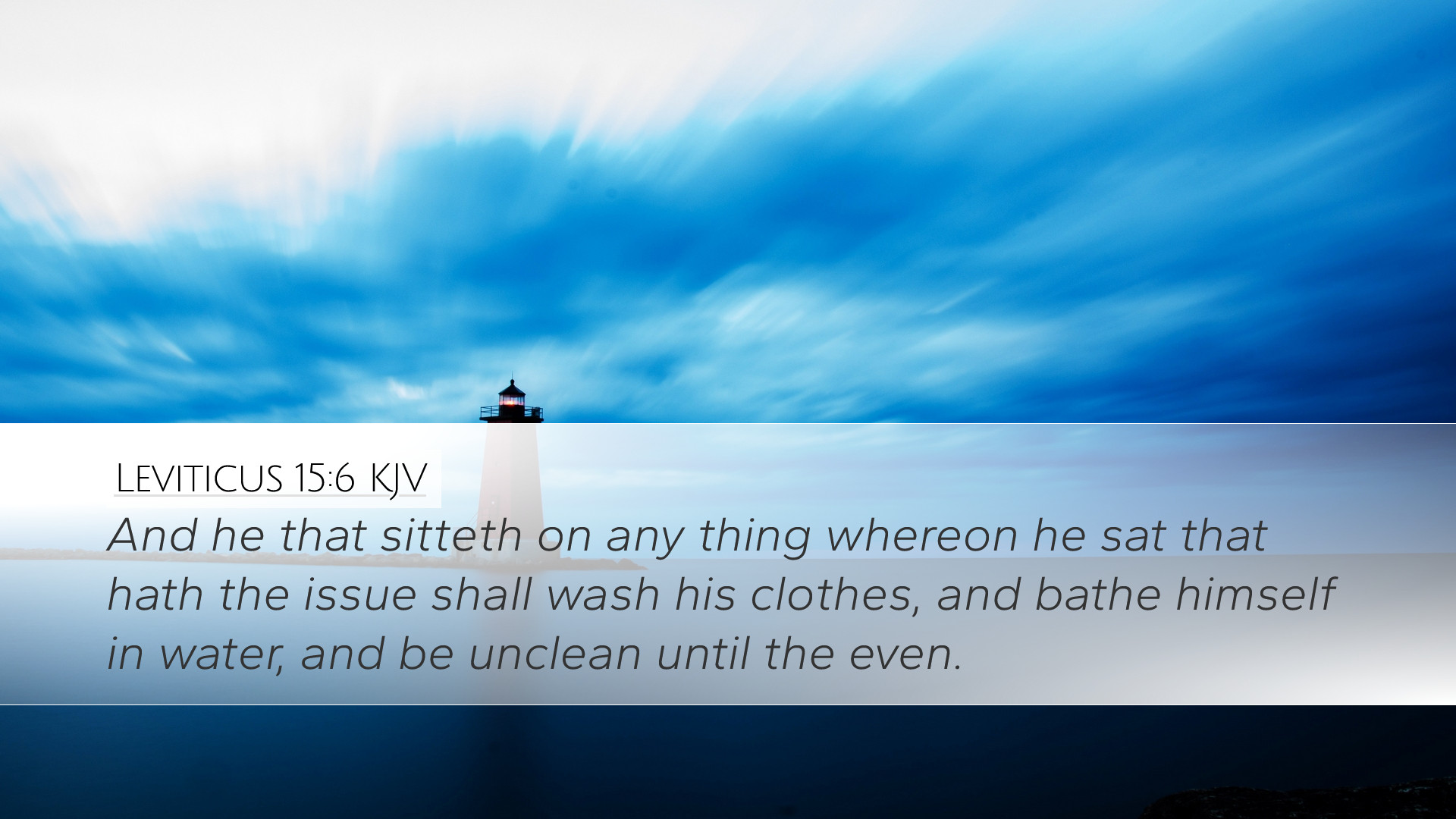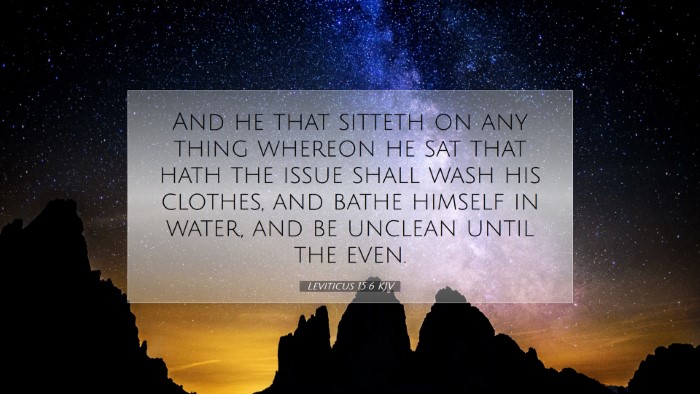Commentary on Leviticus 15:6
Leviticus 15:6 states: "And he that sitteth on any thing whereon he sat that hath the issue shall wash his clothes, and bathe himself in water, and be unclean until the even." This verse pertains to the laws of cleanliness and purity in the context of bodily discharges, which are critical aspects of Israelite ceremonial laws.
General Context
In the book of Leviticus, God provides detailed instructions to the Israelites concerning various aspects of their community life, particularly regarding cleanliness and holiness. The laws serve multiple purposes, including maintaining the health of the community, symbolizing spiritual purity, and demonstrating obedience to God's commandments.
Insights from Matthew Henry
Matthew Henry emphasizes the importance of ceremonial cleanliness and the strictness of these regulations. He notes the following:
- Separation of the Clean and Unclean: Henry explains that these laws reflect the separation between what is clean and unclean, symbolizing the holiness of God, and the necessity for His people to approach Him with purity.
- Consequences of Contact: There is a strong emphasis on the consequences of contact with anything deemed unclean, which includes the necessity for washing clothes and bathing to restore cleanliness.
- Spiritual Significance: The spiritual implications are significant; Henry connects physical cleanliness to spiritual impurity, noting how touching what is unclean can symbolize the influence of sin in one’s life. He encourages believers to pursue holiness actively.
Insights from Albert Barnes
Albert Barnes provides a more theological perspective on these regulations. His commentary includes the following points:
- Symbolism of Cleansing: Barnes interprets the act of washing clothes and bathing as a representation of spiritual cleansing. He draws parallels between physical purification through ritual and spiritual cleansing through repentance and faith.
- Community Responsibility: He notes that the laws serve as a reminder that one's actions can impact the community. By adhering to these laws, individuals protect the holiness of the community and honor God's covenant.
- Temporary State of Uncleanliness: The phrase "and be unclean until the even" serves to remind the Israelites of the temporary nature of being unclean, thus pointing toward the hope of eventual restoration and acceptance back into the community once purification rituals are observed.
Insights from Adam Clarke
In his detailed commentary, Adam Clarke offers further analysis, particularly regarding the societal implications:
- Public Awareness of Purity: Clarke stresses the role of public awareness regarding issues of purity. He believes that such laws serve to maintain a collective consciousness of holiness among the Israelites.
- The Role of the Priest: Clarke further elucidates the priest's duties in assessing and declaring individuals clean or unclean. This illustrates the critical role of spiritual leaders in maintaining community standards of holiness.
- Enduring Principles: He points out how these laws still bear relevance today, as they exemplify the necessity of spiritual life. For Clarke, this serves as a metaphor for how modern believers must also guard themselves against spiritual contamination.
Application for Pastors and Theologians
Understanding Leviticus 15:6 provides rich material for pastors and theologians. Here are some applications derived from the commentary:
- Teaching on Holiness: Pastors can use this verse to teach congregations about the importance of pursuing holiness and maintaining spiritual standards within the community of faith.
- Illustrating Spiritual Cleansing: The symbolism of washing and bathing can be effectively utilized in sermons that focus on redemption and the cleansing power of Christ's sacrifice.
- Community Impact: The interconnectedness of the members within a community can be emphasized, particularly how individual behaviors can affect the collective health of the church.
Conclusion
Leviticus 15:6 reflects not only the cultural and ritualistic practices of ancient Israel but also timeless principles of spiritual purity, community dynamics, and the need for adherence to God's commands. By exploring the insights of prominent biblical commentators such as Matthew Henry, Albert Barnes, and Adam Clarke, modern readers are invited to reflect on both the physical and spiritual implications of cleanliness as it pertains to their faith journeys.


